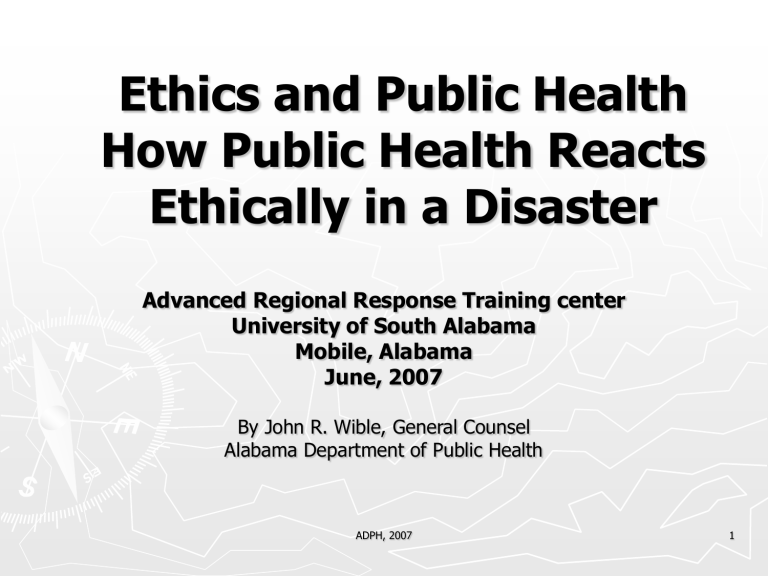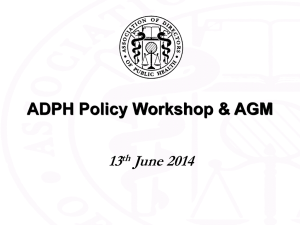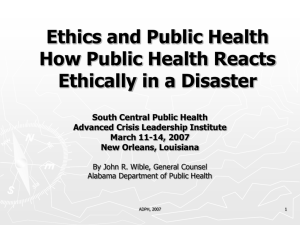Ethics and Public Health How Public Health Reacts

Ethics and Public Health
How Public Health Reacts
Ethically in a Disaster
Advanced Regional Response Training center
University of South Alabama
Mobile, Alabama
June, 2007
By John R. Wible, General Counsel
Alabama Department of Public Health
ADPH, 2007 1
Outline
►
Setup and Introduction
►
Action Principles
►
A Quick Ethical Problem
►
Sources of Personal Ethics
►
Professional Ethical Principles
►
The Eye of the Storm – Application
►
An Ethical Exercise
►
Epilogue
ADPH, 2007 2
Dire Ethical Straits
►
Hurricane Katrina
the people have left the building
►
Pandemic Influenza
the “new and improved disaster”
ADPH, 2007 3
Question from CDC
►
What objectives and principles should be considered in pandemic vaccine prioritization?
►
What is the relative importance of the CDC goals?
►
Which population should have vaccine priority?
►
What is the rationale?
►
How can fairness, equity, efficiency and related principles be reflected in the determination of priority groupings?
►
Who should determine the answers?
ADPH, 2007 4
An Ethical Person
►
Are you and ethical person?
►
From where or whom did you learn your ethical principles?
Hint: “Yo Mama”
►
“ All I Ever Needed to Know,
I learned in Kindergarten ”
ADPH, 2007 5
Our Purpose
The purpose of this presentation is to ask you a lot of questions and help you discover the answers from within yourself so that ultimately, you will be able to make decisions that will allow you to go about living outside yourself.
ADPH, 2007 6
The Pareto Principle
►
The “80-20 Rule” revisited
10% basically ethical
10% basically unethical or “aethical”
80% wandering somewhere in the middle
►
The ethical job of the manager
Differentiate the animals
ADPH, 2007 7
A Personal Aside -
You
►
Who helped shape your ethical principles and how?
►
What did he or she teach you?
►
What do you think is the most important ethical principle of them all and why?
ADPH, 2007 8
Group Ethical Questions
►
What are some universally accepted ethical concepts?
►
Where did they come from and how do we learn them as individuals?
►
How does each of us develop his own set of ethical principles?
►
Do we view those as static or sliding?
►
What is the price of each of us? (For how much would you sell out?)
ADPH, 2007 9
John’s Five Action Principles
►
The “No Delta Principle”
►
To tell the truth, the whole truth and nothing but the truth
►
“We’ll Sing in the Sunshine”
►
Be a Square
►
It’s not about me.
D
ADPH, 2007 10
Sources of Personal Ethical Principles
►
Religious teachings
►
Cultural teachings
►
American Historical Documents
Declaration of Independence
United States Constitution
ADPH, 2007 11
American Historical Documents
►
Declaration of Independence
►
United States Constitution
1776
ADPH, 2007 12
Declaration of Independence
►
►
►
►
►
Set forth the “self evident truth” such as “equality”
Established an ethical basis for independence
What Locke applied to individuals, Jefferson applied to a people – John Adams
Did not condemn the British people
Did not slavery address address African
ADPH, 2007 13
“Self-Evident” Truths
►
“All men are created equal” ( Really?)
►
Endowed by their Creator
Life
Liberty
Pursuit of happiness
►
Modern Comparisons
Life becomes “human dignity’ in UN Charter
Life becomes “personal autonomy” in Belmont
Report
ADPH, 2007 14
Constitutional Principles
►
“We, the People” – social contract theory of government based in personal autonomy
►
“Establish justice” –
Equity
Equality
Fair process
►
“Insure Domestic Tranquility” – peace
►
“Promote the General Welfare”
– the sum of it all
ADPH, 2007 15
Summary of Personal Ethics
Right living
Do no harm
Do not lie
Do not steal
Do not hoard
Moderation
Cleanliness
Contentedness
Perseverance
Self-study
Higher Being
Right Speech
Right Actions
Right livelihood
Right effort
Effort to Improvement
Right mindfulness
Awareness
Right Mental thought
No gods/idols/swearing
Sabbath keeping
Honor parents
Do not murder
Do not commit adultery
Do not steal
Do not lie
Do not covet
ADPH, 2007
† Golden Rule
† Love God/Love man
ﺶ Brotherhood
ﺶ Fidelity/chastity
ﺶ Humility
ﺶ Charity
ﺶ Justice
Equality
Life
Liberty
Happiness
Government
Social contract
Equity
Fair process
Peace
General welfare
16
Professional Ethics
►
The Hippocratic Oath and Medical Ethics
►
Augustine’s “Just War”
►
Nursing Ethics
►
The Belmont Report and Institutional
Review Boards
►
The Public Health Code of Ethics
►
Public Officer and Employee Ethics Laws
ADPH, 2007 17
The Concept of Death
Is the causing or allowing of death always ethically bad?
Cain and Abel
Instructions to wipe out the people of Canaan
Lex talionis, cities of refuge and the
“Avenger of Blood”
ADPH, 2007 18
Summary of Medical Ethics
• Non-maleficence, doing no harm;
• Beneficence, doing what is best for the patient;
• Autonomy, allowing the patient the informed right to choose
• Justice, treating everyone alike
ADPH, 2007 19
Medical Ethics in a Disaster
AMA Policy Statement E-9.067
►
There is a duty to provide urgent care
►
The physician workforce is not unlimited
►
Therefore, balance is required
Live to fight another day
Are physicians required merely stay and not run away
Or to volunteer to come back in and help?
ADPH, 2007 20
Nurse’s Ethics in Providing Care
►
Provide care in a
“non-discriminatory manner
►
There are limits to the amount of personal harm required to risk
►
Cannot abandon a patient
►
Personal risk may depend on the individual condition of the nurse
►
A “sacred duty”
American Nursing Association – December 1994
ADPH, 2007 21
Researchers Ethics
►
►
The Tuskegee Experiment – “Bad Blood”
Tuskegee by the numbers:
600 men in the study
399 infected with syphilis and untreated
201 without syphilis
100 dead of causes “related to” syphilis
74 men survived
40 wives contracted syphilis
19 children born with congenital syphilis
9,000,000 dollars paid out in direct damages
1 good result – The Belmont Commission
ADPH, 2007 22
The Belmont Commission Studied:
►
►
►
►
The boundaries between biomedical and behavioral research and the accepted and routine practice of medicine,
The role of assessment of risk-benefit criteria in the determination of the appropriateness of research involving human subjects,
Appropriate guidelines for the selection of human subjects for participation in such research and
The nature and definition of informed consent in various research settings
ADPH, 2007 23
The “Common Rule”
(Based on the Belmont Report)
►
Established boundaries between research and practice
►
Defined ethical practice based on three principles to include:
Respect for persons
Beneficence
Justice
ADPH, 2007 24
Public Health Code of Ethics (2002)
►
Health: “a state of complete physical, mental, and social well-being, and not merely the absence of disease or infirmity.”
Preamble to the Constitution of the World
Health Organization, 1948 as affirmed by the
Code.
►
The Code’s 12 Principles
►
“Family Values”
ADPH, 2007 25
Public Officer Conduct Laws
Nature and Scope of Public Ethics Laws
►
Very narrowly constructed and construed
►
Contrasted with the broad sweep of professional codes
ADPH, 2007 26
Summary – Professional Ethics
►
Death acceptable
Do no harm
Patient first
Value on life
Proper relations
Confidentiality
Follow law & morals
Duty to care
Balance
Not discriminate
Not abandon
“Sacred duty”
►
Respect person
►
Beneficence
►
Justice
Individual rights
Community
Empowerment
Use Information
Timeliness
Diversity
Confidentiality
Collaboration
Competence
Public trust
Interdependence
Not abuse public position
ADPH, 2007 27
-The Eye of the Storm-
What Really Happens in a Disaster
ADPH, 2007 28
Effects on Victims
and Staff
Psychological, physiological and physiological Symptoms:
►
Irritability or anger, blaming or denial, mood swings, fear of
► recurrence, hyperactivity, feeling stunned, helpless, numb, or overwhelmed;
Loss of appetite and energy, headaches, chest pain, and fatigue;
►
►
►
Isolation, withdrawal, diarrhea, stomach pain, nausea;
Increase in alcohol or drug consumption;
Nightmares and inability to sleep;
►
►
Concentration and memory problems;
Sadness, depression and grief;
All leading to BAD CHOICES
ADPH, 2007 29
Are there Really No Rules
?
ADPH, 2007 30
Euthanasia
►
Is euthanasia victims?
ever an option for suffering
►
What is it?
►
Assuming the answer is “yes,” How would you justify it?
►
Is it a fair balance between individual rights and the rights of society?
ADPH, 2007 31
This brings up the question of “No”
Authorities, citing the experience at Memorial
Hospital in New Orleans – short of a pandemic – your worst case scenario and
Supreme Court authority . . .
►
Advises that in the question of whether euthanasia is an option, the answer is “no,”
►
Euthanasia is never an option
►
(
Unless it is the end of the world as we know it and it doesn’t matter
)
ADPH, 2007 32
Let’s Just Let them Eat Cake*
OK, so we can’t “depopulate” the victims, can we just let them die – a philosophical interlude: Utilitarianism vs. Egalitarianism
* Quote from Marie Antoinette some time before her execution .
ADPH, 2007 33
Utilitarianism vs. Egalitarianism
►
►
►
Jeremy Bentham’s theory of utilitarianism (consequentialist ethics) assesses what is right or good based on whether the consequences of the actions to be taken will be good
Immanuel Kant’s deontology theory
(principlism or egalitarianism) focuses on non-consequentially based notions of good - deciding what is right or good is based on meeting duties and obligations
These contradistinguished ideas will clash over and over
ADPH, 2007 34
Modern Disaster Triage
►
►
►
In disasters there is a switch from standard medical ethics with the primary focus on
Individual autonomy to an ethics of public health with a primary focus on the health of the community
The overarching goal is to minimize morbidity and mortality during the pandemic (according to CDC)
Will it be most good or greatest need ?
ADPH, 2007 35
Utilitarianism Says:
►
The goal is to help those for whom you can do the most good following the longestablished standard in military medicine
►
Advantages: follows a clear, simple, community-recognized goal in a potentially chaotic environment
►
Disadvantages: situations will arise with no clear utility-based answer that may lead to
“unintended, insidious discrimination”
ADPH, 2007 36
Egalitarianism
►
Goal: to help those in greatest need
►
Ranks patients based on severity of illness, with patients in the most severe condition receiving the medical attention
►
The ultimate goal such as limiting morbidity and mortality during the pandemic is deprioritized in order to preserve the egalitarian principles
ADPH, 2007 37
Hybrid Triage
►
Uses both concepts
Utilitarian approach
Egalitarian methods
►
Requires sorting out into 3-4 groups
►
Treat those in the group before going to the next lower group
ADPH, 2007 38
Ethical Responsibilities in Triage
►
Plan NOW! See “Bryant’s Rule”
►
Establish a Triage Review Committee
Plan
Oversee
Evaluate post-event
►
Engage the public in the discussion
►
An experienced triage officer
ADPH, 2007 39
Altered Standards of Care
When it permissible from an ethical and legal standpoint to provide less than the care normally or traditionally expected or held to be what is referred to in both the medical and legal professions as the “standard of care”?
►
Goals
►
Focus
ADPH, 2007 40
Ethical Considerations
►
►
►
►
►
The aim is to keep the health care system functioning and to deliver an “acceptable” quality of care to preserve as many lives as possible
The plan must be community wide
There must be an adequate legal framework to allow for the altered standards of care
The rights of individuals must be protected to the extent possible and reasonable under the circumstances
The public must be informed on planning and decision making pre, during and post event
ADPH, 2007 41
Legal Concerns of Altered Standards
How to make it legal:
►
Change the laws at federal and state levels directly
►
Change laws to allow for regulatory changes
►
Consider pre-drafting emergency orders for the Governor to sign in an event invoking the altered standards of care
ADPH, 2007 42
CDC’s Plan for Rationing Vaccine
►
CDC scares us with their predictions
►
The system of manufacturing vaccine is old and tired
►
CDC has devised priority groups with subgroups
Health care workers
Public service workers
High risk populations
ADPH, 2007 43
Ethical Look at the CDC Plan
►
A hybrid system
Utilitarian goal
Egalitarian execution
►
Allows for local input should the locals input want
►
Buck-passing and the failure to plan will be a catastrophic ethical failure
ADPH, 2007 44
Rationing Ventilators
►
The American Association of Respiratory
Care has a recommended plan. Consider one state’s draft plan to recommend to hospitals
►
Triggered by declarations by government edit, activation of National PI Plan or local hospital HEICS
ADPH, 2007 45
Legal Issues
►
►
►
►
What is legal may not necessarily be what is ethical and what is ethical may not necessarily be what is legal
Legal Issues will be criminal, civil and regulatory and administrative law issues
Changes to the laws and legal precedents made per se, to allow rules to be changed or by executive directive such as PDD
Change will require consensus or at least consultation with all stake-holders
ADPH, 2007 46
The Right to Desertion –
“When is it time to go to the house”
►
Practical dilemmas faced personally – what are my obligations to me and my family?
►
Professional dilemmas – conflicting ethical principles
Autonomy vs. non-maleficence
Autonomy vs. beneficence
Autonomy vs. justice
ADPH, 2007 47
Professor Tabery Says:
If you don’t come to work, the problem doesn’t go away. In fact, the problem only gets worse. In a disaster situation or a pandemic, every employee will make a difference by contributing his or her part to providing care. All employees must ask themselves, ‘If I don’t work in times of crisis, then who will?’
ADPH, 2007 48
A Suggestion
►
Take a deep breath
►
Look for the balance
►
Remember John’s principle of living outside yourself based on the truth within yourself
(This assumes you know the truth)
►
Planners and facility administrators must
“think outside the box” – but do it now
ADPH, 2007 49
►
►
Summary-
John’s Five Action Principles
The “No Delta Principle”
D
To tell the truth, the whole truth and nothing but the truth
►
“We’ll Sing in the Sunshine”
►
Be a Square
►
It’s not about me.
ADPH, 2007 50
Epilogue
The Eagle soars above the din, of mankind's rushing out and in,
And lesser creatures left to spin,
The Eagle soars from deep within.
His course is true as gaffer's pike,
His keen eye pierces like a spike,
His quest surrounds him like a dike,
The Eagle soars, but phantomlike.
Those who on the Earth have stood,
Thinking that they never could,
Nor many even perhaps should ... but,
The Eagle soars because he would.
ADPH, 2007
- John R. Wible, 1981
51








